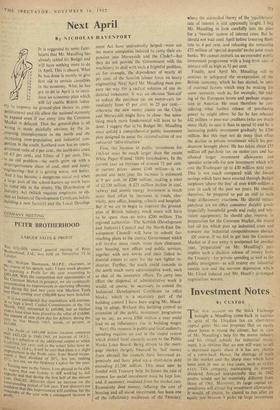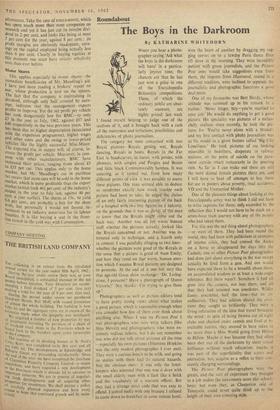Investment Notes
B3 CUSTOS
THE new account on the Stack Exchange brought a Maudling come-back in equities in spite of the Lloydian tax on short-term capital gains. No one proposes that an equity share boom is round the corner, but in view of Mr. ?vlaudling's help for the motor industry and his virtual subsidy for industrial invest- ment, it is obvious that no one wilt want to sell a depressed equity share if it has any chance of a come-back. Hence, the shortage of stock in the market . and the sharp rises which have been seen in one or two cases, such as GUEST KEEN. This company, maintaining its interim dividend, forecast unexpectedly that its 1962 profits would not be materially different from those of 1961. Moreover, its large capital ex- penditures will attract big investment allowances. It would, of course, be absurd to run after an equity just because it picks up large investment allowances. Take the case of ROLLS-ROYCE, which has spent much more than most companies on research and yet it has just cut its interim divi- dend to 2 per cent, and looks like being at most 5 per cent for the year, against 8 per cent.: its Profit margins are obviously inadequate, earn- ings on the capital employed being actually less than 6 per cent. Clearly in buying equities at this moment one must have stricter selectivity tests than ever before.
Motor Shares
This applies especially to motor shares—the immediate beneficiaries of Mr. Maudling's aid. 1 have just been reading a brokers' report on nme, whose production is now on the upturn. The fact that the company is maintaining its dividend, although only half covered by earn- ings, indicates that the management expects Profits to improve. Yet the net profit per vehicle has sunk dangerously low for BMC—to only i7 in the year to July, 1962, against £17 and £40 respectively in the two previous years. This has been due to higher depreciation (associated With the expansion programme), higher wages and other costs and the swing to lower-priced Vehicles like the highly successful Mini-Minor. The expected rise in output will, of course, in- crease the profit per vehicle. Moreover, in com- m. on with other manufacturers, BMC have increased their prices, ranging from about £5 to £33 per car. This applies only to the home market, but Mr. Maudling's cut in purchase lax means that more cars will be sold in the home market, which is more profitable than the export market (which took 46-1 per cent. of the industry's entIn4 in the year to July last, against 40 per C,ent. a ear earlier). The shares at 15s., to yield "vestment Per cent., are probably a buy for the short term, but personally I would not favour ,
in an industry notorious for its labour t.youbles. It is like buying a seat in the front- line trench in the 'cold war,vvith Communism.







































 Previous page
Previous page